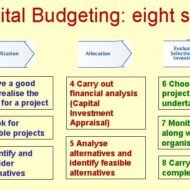Posted by Managementguru in Business Management, Entrepreneurship, How To, International Business, Marketing, Project Management, Sales, Startups
on Mar 11th, 2014 | 0 comments

Export can be in the form of merchandise (goods) or services (invisibles). When an entrepreneur wants to spread out his scope of business activity beyond the territory of his nation it is called export, whence he has to prepare himself to confront the challenges prevailing in the global market. How to go about Export? Business by itself calls for discipline whether you talk about your credit policy, quality of your product or services, on time delivery, payments, fund rotation, human resources management and the like. The taste of success in the domestic market gives you the necessary confidence to spread your wings far and wide. To be a part of the global market, you are expected to imbibe not only more discipline and order but you should be very thorough about the procedures and policies of the country, to which you are planning to export and the various legal formalities pertaining to your business activity. How to Export From India Pic Courtesy: Procedure to Start Export Business from India What will be your plan of action if your merchandise is disapproved of its quality after reaching the destination or the shipment gets destroyed due to some eventuality? To combat contingencies we have to have a representative working for us in the chosen place of activity who would report and handle the proceedings. Pre-Requisites for Exporting Goods: How many people do you think who have acquired the desire to export their products have a clear idea about the steps involved in starting an export business? First you have to secure the IEC CODE (import export code) from the DGFT (Director General of Foreign Trade) that comes under THE MINISTRY OF COMMERCE AND INDUSTRY. What is IEC Code? Import Export Code (also known as IEC) is a 10 digit identification number that is issued by the DGFT (Director General of Foreign Trade), Department of Commerce, Government of India. Info Courtesy: Shiprocket.in It is also known as Importer Exporter Code. It is mandatory for companies and businesses to obtain this code to start a business that deals with import and export in the Indian Territory. It is not possible to deal with export or import business without this code. While exporting you get the following edge over others: Exposure to forex marketExposure to diversified cultureExposure to varied laws and legal formalitiesExposure to business risks which you must take up as a challenge Having businesses in various countries is better than having all businesses in one country. It saves you during periods of economic recession. You experience market growth by entering into different and new markets; Asian and European markets are flooded with traders from all around the world since these regions enjoy a locational advantage in the world map and well connected through the sea and land. RBI Policies: Exporters must be aware of the fact that RBI policies are very severe when it comes to foreign exchange. So you should have proper informational inputs from the correct source and your capital has to be invested accordingly. Slide Courtesy: Import and Export Policies and Procedures Exploring unfamiliar and exotic markets is very difficult as they are always dynamic. You should see to it that you keep yourself posted with updates on INTERNATIONAL FINANCE, LENDING RATES etc. Also Read: 10 key steps to export success You can make a small business big and beautiful by adding some flavor to it like, Right time to launch your product in the global scenario, People’s preference being given priority by doing some demographic survey, Attractive campaigns and of course Your unendurable passion for business will do the rest to make your venture a successful one. Read...

Posted by Managementguru in Entrepreneurship, Human Resource
on Feb 25th, 2014 | 0 comments

Who is an Entrepreneur? An entrepreneur is one with long term vision, creativity, uniqueness and the most conspicuous feature is undoubtedly his risk taking ability. He embarks on uncertain investments and also possesses an unusually minimal level of uncertainty aversion. He always comes out with brilliant business ideas since he is open to new information available in the rapidly changing business environment; this also facilitates self-directed and independent decisions aiding in quick growth maximization of the business enterprise. Concept of Entrepreneurship Entrepreneurship is all about action that involves opportunity exploitation and venture creation. The concept of entrepreneurship is becoming increasingly popular in developing countries as it tends to promote economic growth of a nation. “No entrepreneur, no development,” is the kind of significance attached with entrepreneurialism. Who is an Entrepreneur Though entrepreneurship is an individual’s free choice activity, it emerges and functions in a social and cultural setting. An entrepreneur must be prudent in choosing a business activity that will be supported and valued by the society and that which improves his economic standards. Consumers are always on the look-out for a product or a service that is different but unique. This proves to be an advantage for an entrepreneur to exploit the unexplored niches of the market segment. An entrepreneur has to observe and act upon opportunities that are unusual but promising. He has to study the pros and cons of a project in terms of capital investment, plant layout, production facility, labor availability, market proximity, demography, people’s preference and economic viability. The distinct features of an entrepreneur for a better understanding: Persistence and perseveranceResourcefulness to take the business activity to the next levelEternal quest for knowledgeQuality consciousSystematic planningSelf-confidenceDaringCrisis management with easePersuasion –capability to convince the customers and othersStrategy king Excellent communication skills Proficiency in a variety of subjects and disciplinesTo them , work is passionNonchalance and the like. It is the combination of body of knowledge, set of skills and cluster of appropriate motives that makes an entrepreneur a star performer. He is the pivot about which all other factors of production, productive resources and techniques revolve. Innovativeness, risk taking ability and proactiveness are the three dimensions fundamental to the concept of entrepreneurship. Entrepreneurship is a way of thinking, reasoning and acting that is opportunity obsessed (Timmons). Lakshmi Mittals and Warren Buffets belong to this category where in they have created value through recognition of business opportunities. https://www.instagram.com/p/B-t7sPKHkq4/ Follow YoungHstlrs and Entrepreneurzone for Business and Entrepreneurship...

Posted by Managementguru in Financial Management, Principles of Management
on Feb 20th, 2014 | 0 comments

Capital Budgeting- Long Term Resource Planning What is Capital Budgeting? Capital Budgeting refers to the process of planning expenditures that give rise to revenues or returns over a number of years. The process of investment analysis is essential to have a sustainable advantage in the competitive market and to stabilize the profits through resourceful strategic business units. The firm’s management must be on the alert to explore the opportunities present in the market. Obsolete product lines and changes in consumer tastes may present additional problems to a business enterprise affecting the profitability and growth. When a firm decides to venture into projects that demand huge investments, the management has to scrutinize the economic feasibility of such projects. The process of capital investment is also crucial because the projects are for the most part irreversible. Say, for example, if a business firm purchases a special type of machinery, and after installation, if the firm reverses its decision to sell the merchandise due to some technical reasons, it will have only a very small second hand value. Business firms based on the cash flow of the project and the capital recovery period do long-term investment. Why do firms opt for capital budgeting. The reasons may be: To replace worn out equipments that will affect the production efficiency To replace obsolete equipments to install new and more efficient ones To expand production facilities in lieu of increasing demand for the firm’s products and to capture new markets To divest the surplus funds from other business units and to rotate the funds, as idle funds will not generate any revenue To develop new products Research and development Investments made to comply with government regulations, such as projects undertaken to meet government’s health and safety regulations, pollution control and to satisfy other legal requirements. People Involved The proposals for new projects come from the internal environment, such as department heads, executives, employees and of course the management. Experts in product development, marketing research, industrial engineering examine the investment proposals and they may regularly meet with the heads of other divisions in brainstorming sessions to zero in on the proposals. This free course from Udemy is Ideal for people interested in entrepreneurship, fintech, big data, startups, finance, private equity, VCs, & investing. https://www.udemy.com/crowdfund-investing-101-the-basics-of-equity-crowdfunding/ Departments Involved While the firm’s top management makes the final say or decision to undertake or not a major investment project, the process is likely to involve most of the firm’s divisions. Each department has to present its view on the feasibility and viability of the project. The marketing department- on the demand for the new or modified products that the firm plans to sell The production, engineering, personnel and purchasing departments- on the estimation and cost of the investment projects The financing department on- how the required investments funds have to be raised. Thus, the process of expenditure analysis can truly be said to integrate the operation of all the major divisions of the...






